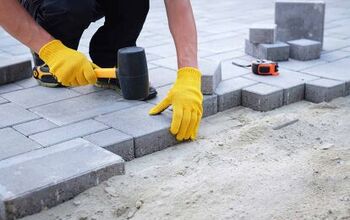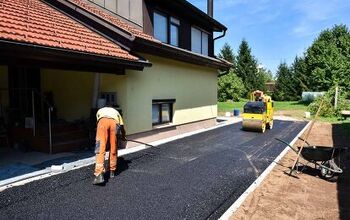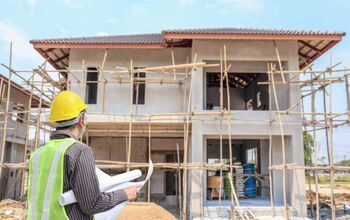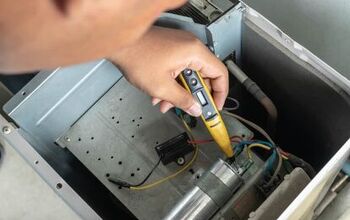How Long Does It Take To Pave A Driveway?

Asphalt driveways are quite common and with good reason. For one, they look stylish in residential settings and are quite a bit less expensive to install than a concrete driveway. It is also possible to pave an asphalt driveway as a DIY endeavor, though it is always recommended that a professional do the job.
When it comes to the paving process, what kind of timeline are you looking at? The paving process involves quite a few steps. Before any paving can be done, the old pavement has to be removed. It should take no more than a day to remove old pavement and a day or two to lay down the new pavement, depending on the size of the job. Curing is needed afterward to ensure the hardness of the paving job.
Do You Need a Brick and Stone Floor Contractor?
Get free, zero-commitment quotes from pro contractors near you.

The Benefits of Asphalt Paving
Before we get into the timeline of a paving effort, it helps to know why you would want to go with asphalt in the first place. There are a few reasons for this. Afterward, you will see why nearly 94% of all roads in America are paved with asphalt.
Cost
Like it or not, cost will be the primary factor in almost any project. Concrete might look a bit nicer but it is substantially more expensive to install. Asphalt provides other benefits (as we will see down further), but they are also quite cost-effective.
Asphalt can be paved far more quickly and cost-effectively than just about any other type of pavement. If you are planning to pave your driveway, the cost difference between asphalt and concrete will likely come as a surprise.
Safety
Perhaps just as important as cost, though not talked about enough, is the safety aspect of asphalt. Asphalt pavement has a higher skid resistance than other types of pavements. Even better, it is unharmed by snow and ice chemicals.
Asphalt pavement is also smoother. That means less chance of uneven surface area that could potentially damage your car or create a tripping hazard. Smoother pavement also extends its life by at least 10 percent, making it more durable over the long-term.
Durability
Asphalt pavements are flexible, meaning that they can hold up to serious loads without taking any substantial damage. Even better, asphalt paving can be designed to meet just about any conditions or environment.
Because of the combination of cost-effectiveness, safety, and overall durability, it should come as no surprise that asphalt is such a common choice.
The Asphalt Paving Process
There is quite a bit that goes into the actual process of paving asphalt. Yes, your driveway is a relatively small project, but there are still proper steps that need to be followed. Here is your walkthrough on what to expect for paving an asphalt driveway.
Scheduling and Permits
It starts with scheduling. Generally speaking, you have to schedule anywhere from 2 to 4 weeks out. Companies are busy and need to schedule you around other appointments. If the company you go with is particularly busy, then the timeline could be even longer.
Another thing to consider when paving a driveway are local requirements. Each municipality will have its own set of rules and regulations regarding paving. If your municipality has any permit requirements, the company that you choose will take care of getting them. Moreover, they will make sure that any utility lines in the area have been located and marked off before they begin. Hiring a professional can save you a lot of hassles other than the physical paving.
Removing the Old Paving and Installing the Sub-Base
When the construction company finally gets out, they will begin the process. After they have marked the utility lines, they will start to remove all of the old paving. The excavation process will remove all of the old paving and prepare for the sub-base that will need to be added prior to paving.
Sub-base materials are then laid down carefully. Most of the time, they are compacted with a vibratory roller and some form of vibratory plate equipment. Generally speaking, the sub-base and compacting process will happen the same day as the removal of the old paving.
Paving
Now it is time for the actual paving process to begin. Keep in mind that paving can be done depending on how long the sub-base process takes and the availability of the paving company. The company may lay the sub-base and compact it but can’t come out again for a few days. It may actually take them one day to complete, though.
The paving itself should take a day to complete, depending on the size of the driveway. A paving machine lays down an even, smooth thickness of asphalt, using a hot-mix asphalt. Physical crew members work in the tight spots to ensure an even paving.
Curing
Finally, there is the curing process. This is what ensures that the asphalt hardens properly. Over the next 3-5 days, that means keeping vehicles off of the pavement. Usually, the company will tape off the driveway to make sure that no one can drive onto it.
When the initial curing is done, driving vehicles is fine but parking is not. Give it two or three weeks before you start parking again. That time span allows your driveway to properly cure.
Do You Need a Brick and Stone Floor Contractor?
Get free, zero-commitment quotes from pro contractors near you.

Final Thoughts
The paving process is really not all that bad when you bring in a professional to do the job. Attempting to do it yourself can lead to serious issues if not done properly. Professionals mark off all the utility lines and ensure that paving does not interfere with them.
Most importantly, a professional will ensure that the sub-base is put in correctly and paving is done smoothly. With a little bit of patience to allow for curing, you can have your fully paved driveway done in a few weeks from start to finish. All at a cost-effective rate that will ensure you have a smooth, safe, aesthetically pleasing driveway. The investment in a professional paver is a small one, all things considered.
Related Guide

Ryan Womeldorf has more than a decade of experience writing. He loves to blog about construction, plumbing, and other home topics. Ryan also loves hockey and a lifelong Buffalo sports fan.
More by Ryan Womeldorf



























